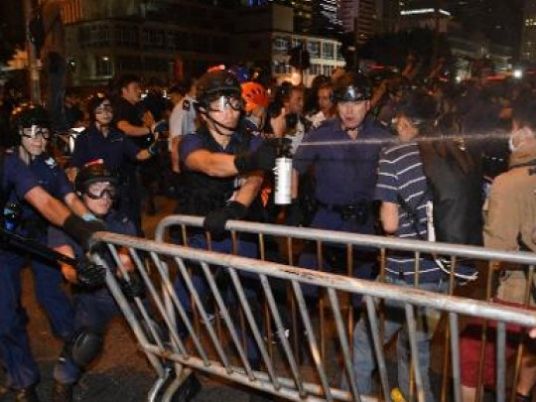
Hundreds of Hong Kong pro-democracy protesters faced off against police in a fresh escalation of tensions on Sunday night, as officers fired pepper spray at angry students trying to surround the government headquarters.
In chaotic scenes, protesters wearing helmets and wielding umbrellas attempted to breach the police cordon guarding the office of Chief Executive Leung Chun-ying, during a rally at the main Admiralty protest site.
"I want true democracy!" protesters yelled at police who used loudspeakers to order them them to disperse.
"Surround the headquarters. Paralyse the government."
Apart from those on the front lines, several thousand people filled Tamar Park near the legislative complex.
Overall numbers have dwindled since the mass protests started two months ago, calling for free leadership elections in 2017 in the semi-autonomous Chinese city.
Protesters have become increasingly frustrated as China refuses to budge on its electoral plans for the city, and public support wanes for the occupation of major roads in different locations.
Organisers called Sunday's rally after police last week cleared one of the protest sites in the Mongkok district, making more than 100 arrests.
Protesters Sunday stormed past police lines to occupy Lung Wo road, a main traffic artery connecting the east and west of Hong Kong island.
China says candidates for the 2017 election must be vetted by a loyalist committee, which demonstrators say will result in the election of a pro-Beijing stooge.
But protesters have also expressed anger over the government's perceived cosy relationship with Hong Kong's powerful tycoons.
Leung admitted on Saturday that frustration among young people over a lack of "upward mobility" was fuelling the protests.
His comments to a government committee meeting on poverty came weeks after he shocked ordinary Hong Kongers by saying open elections were not feasible because they would result in the poor dominating politics.
The city's leader is currently selected by a 1,200-strong pro-Beijing committee stacked with elites from different business sectors.
